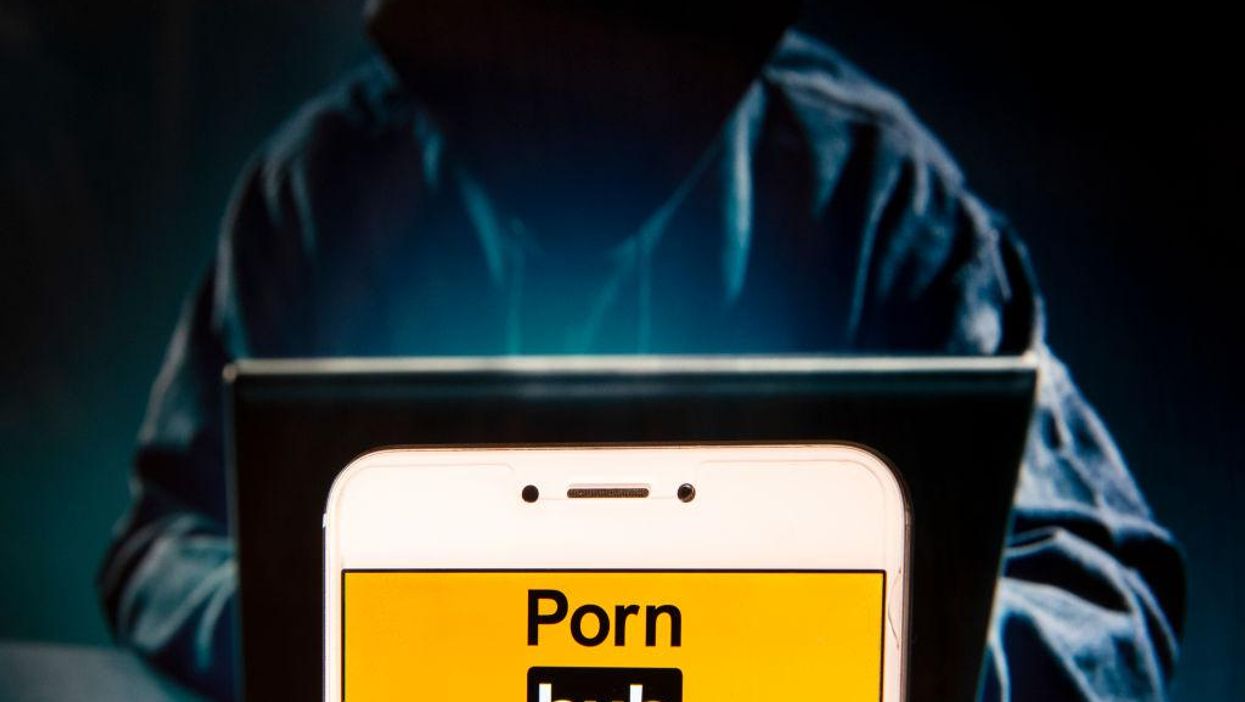
Miguel Candela/SOPA Images/LightRocket via Getty Images

'While these suit-wearing traffickers got rich, their victims have lived with the pain and fear. That has to end now.'
Sens. Ben Sasse (R-Neb.) and Jeff Merkley (D-Ore.) on Friday introduced new legislation to crack down on pornography websites that may be complicit in human sex trafficking or rape.
Their bill, called the "Stop Internet Sexual Exploitation Act," would require online platforms that host pornography to implement "critical safeguards to protect Americans from sexual exploitation online," the senators said in a news release.
A recent exposé by New York Times columnist Nicholas Kristof showed how Pornhub, one of the internet's largest and most popular pornography websites, permits videos featuring sex trafficking victims, non-consensual sex, child rape, and other heinous criminal activity on its platform with little or now oversight. Kristof reported that the victims of these crimes have little to no recourse to have videos of their abuse removed from the internet. Sasse and Merkley aim to change that with their bill.
"Human dignity matters. A decent society has an obligation to fight sexual exploitation and human trafficking," Sasse said. "For years, Pornhub and its parent company Mindgeek monetized rape, abuse, and child exploitation. While these suit-wearing traffickers got rich, their victims have lived with the pain and fear. That has to end now. Our bill is aimed squarely at the monsters who profit from rape. Washington ought to be able to come together to combat human trafficking and make this right."
"The posting of intimate photos and videos without participants' consent is a massive invasion of privacy that drives shame, humiliation, and potentially suicide," Merkley said. "While some online platforms have recently announced steps to change some practices, much more needs to be done. We must ensure that not another single life of a child, man, or woman is destroyed by these sites."
The legislation would impose several new restrictions on online pornography platforms to protect victims of abuse.
Under the proposed law, pornography websites would be required to verify the identity of any user who wants to upload a video to their website and the user must provide a signed consent form from every individual appearing in the video before it can be published. The law would create a private right of action against any video uploader who posts pornographic content without the consent of the individual(s) featured in the image or video, giving victims of "revenge porn" a right to sue.
Also, pornography websites would be required to feature a notice or banner on the website instructing how an individual can request removal of a video featuring persons who did not consent to having that content uploaded on the platform. Video downloads from pornographic websites would be prohibited by law.
Pornographic websites would also be required by law to maintain a 24-hour hotline staffed by the website that people can contact to request removal of a video that has been distributed without their consent. The website would be required by law to remove the flagged video within two hours. They would be required to use software to block a removed video from being re-uploaded after removal.
The Federal Trade Commission would be responsible for enforcing the various parts of this legislation. The bill would also create a database of individuals who have indicated they do not consent to having pornographic materials about them distributed on the internet and porn sites would be required to check new content against this database before it can be uploaded to their platforms.
In response to Kristof's damning article, Pornhub this week announced several policy changes to combat the uploading and distribution of abusive content. Going forward, the website will ban unverified uploaders and has suspended all previously uploaded content that was not created by verified users or Pornhub partners. The company purged more than 10 million videos that did not meet this standard, removing almost 80% of the content on its website.
Sasse and Merkley's legislation would force other websites to follow suit and go even farther to crack down on abuse. Kristof praised the senators for working in a bipartisan fashion to fight against online rape videos and child pornography.
"The porn platforms have shown that self-regulation is not enough," Kristof tweeted Friday. "They did nothing for too long and simply monetized assaults on children. Some regulation is essential, along with liability both to compensate victims and incentivize better self-policing."
Laila Mickelwait, the director of abolition for anti-sex trafficking group Exodus Cry and the founder of the #Traffickinghub campaign — a movement that seeks to hold Pornhub accountable for "enabling and financially profiting off of videos of real sex-trafficking, child sexual abuse and other non consensual content" — hailed the proposed legislation as "highly critical" in a statement to TheBlaze.
"This new bi-partisan legislation by Senator Sasse and Senator Merkley is a highly critical and essential preventative measure that will do an enormous amount of good in stopping the monetization and immortalization of victim's sexual trauma on mainstream porn sites such as Pornhub," Mickelwait said.
She further called on Congress to ensure that there is third-party oversight of pornographic websites to enforce compliance with the proposed regulations.
"These regulations must be implemented by a third-party and use reliable methods for age verification, identification, and the guarantee of consent for those in videos uploaded to porn sites. We have evidence of fake IDs and forged documents being used in the past on these sites and they cannot be trusted to self-police," she said.
"We must also see serious consequences for non-compliance such as risk of shut-down and hefty monetary fines in order for this law to have teeth."
Editor's note: This article was updated with comments from Laila Mickelwait, the director of abolition for Exodus Cry.